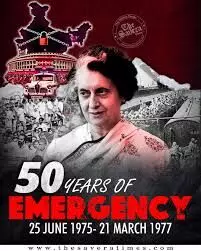Fifty Years Since the Emergency: A Moment of Reflection Dr(Lt Col) Atul Tyagi, Advocate,

"Eternal vigilance is the price of liberty."
Fifty years ago, India witnessed one of the darkest chapters in its democratic history, the imposition of a state of Emergency by then Prime Minister Indira Gandhi, lasting 21 months. This act shook the foundations of the nation and marked a critical inflection point in the evolution of our political system. It was a defining moment not only for political leaders and activists but also for the citizens of India.
The Emergency period was characterized by a disturbing clampdown on democratic freedoms. Opposition leaders were arrested, civil liberties were suspended and fundamental rights including freedom of speech and the right to peaceful assembly were brutally curtailed. Press censorship was imposed, and attempts were made to undermine the independence of the judiciary. These authoritarian actions reflected a dangerous drift towards dictatorship.
To the present generation, the Emergency may seem like a distant historical event. However, its implications continue to echo in our democratic consciousness. Article 352 of the Indian Constitution empowers the President to declare a National Emergency in case of war, external aggression, or armed rebellion, none of which were present in 1975.
The spark for mass dissent was ignited by a student-led agitation in Gujarat under the leadership of Jayaprakash Narayan (JP), which soon escalated into a nationwide movement against the Congress regime. On June 12, 1975, the Allahabad High Court found Indira Gandhi guilty of electoral malpractices in her contest against Raj Narain from Rae Bareli. The verdict not only nullified her election but also barred her from contesting in the future. Though the Supreme Court later allowed her to continue as Prime Minister, she responded by imposing Emergency under Article 352(1) of the Constitution. Empowered by absolute authority, she introduced the 42nd Amendment, which among other things, extended the term of Parliament and weakened institutional checks and balances. During emergency, Indian populace first time experienced mass censorship, arbitrary arrests, suspension of civil liberties, forced sterilizations, and press muzzling which left it asphyxiated.
Shrewd supporters of Indira Gandhi left no stone unturned in justifying emergency defended the Emergency as a necessary tool needed to re-establish rule of law, restore stability, enforce discipline, and augment socio-economic reforms during the period of seeming anarchy & chaos. They put up the plank of Article 352 which allowed for proclamation of Emergency due to “internal disturbance” Though the root cause was Allahabad court judgment which left Indira Gandhi without any armour to save her position unless constitutional crisis was ignited.
While the Emergency was a period of severe repression, it also served as a crucible of experience for opposition leaders. Many emerged from it more enlightened, humble, and resilient. It steeled their resolve and deepened their commitment to democratic values. The emotional account of Rajnath Singh, who was denied the final glimpse of his deceased mother, reflects the extraordinary personal sacrifices made during that time.
It is also essential to acknowledge that institutions like the press and judiciary faltered during this critical period, often failing to uphold the minimum standards of independence and propriety.
As we reflect on this solemn anniversary, it serves as both a warning and a lesson reminding us of the fragility of democratic values and the constant vigilance required to protect them.
Dr (Lt Col) Atul Tyagi
Veteran Indian Army officer turned lawyer and academician with 39 years of experience. Registered advocate since 2008, holding LL.M and Ph.D in Law. Founder of Fair Law Practitioners and member of Supreme Court Bar Association and Delhi High Court.
